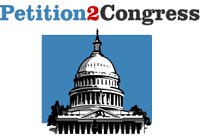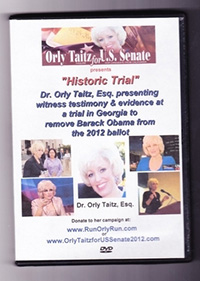Letter to Judge Reid in Indiana Superior Court
Posted on | November 20, 2012 | 1 Comment
Dr. Orly Taitz ESQ
29839 Santa Margarita pkwy, ste 100
Rancho Santa Margarita CA 92688
Case No.: 49D14-1203-MI- 012046
Via fax and Federal Express
Response to 11.09.2012 fax from Judge Reid sent to attorney Gregg Black and forwarded by Gregg Black to Orly Taitz via fax
Attn Honorable Judge Reid
Dear Judge Reid,
1. I received from you a letter stating that this court intends to hold a hearing to show cause regarding release and publication of a certain audio transcript of the October 22 hearing, which contains expert testimony of forgery in the birth certificate of Barack Obama. “Parties are ordered to show cause whether or not they should be in Contempt of Court for the release and posting on “Youtube” of the audio recording of October 22, 2012 hearing, all in violation of this court order and pursuant to the Code of Judicial Conduct rule 2.17”
2. Your Honor, please listen to your own instructions on the audio CD of the hearing. The only court order in regards to recording given by you, was an order, stating that there “should not be any video recordings and no cameras in the courtroom.” You did not give any other orders in relation to recording, posting on you-tube or anything else.
3. I did not violate your order and I did not make any video recording and I did not have any cameras in the courtroom.
4. To the best of my knowledge not one single human being violated your order. Nobody made any video recording and nobody had any cameras in the courtroom.
5. I did not post anything on you-tube.
6. The only thing that exists on you-tube, is an audio, which to the best of my knowledge was lawfully purchased from you, the court, through your own court reporter for $25 and which was posted on you-tube by a third party.
7. There was never any order stating that parties are not allowed to lawfully purchase audio recording from the court.
8. There was never any order stating that parties are not allowed to post on you-tube audio recordings lawfully purchased from the court.
9. To the best of my knowledge nobody violated any of your orders.
Moreover, the Code of Judicial conduct relates to what you, as a judge, supposed to do. Preamble of the Code of Judicial Conduct clearly states that it relates to behavior by the judges, not parties and not attorneys.
Indiana Code of Judicial Conduct
Adopted Effective March 1, 1993
Including Amendments Received Through January 1, 2011
PREAMBLE
[1] An independent, fair and impartial judiciary is indispensable to our system of justice. The United States legal system is based upon the principle that an independent, impartial, and competent judiciary, composed of men and women of integrity, will interpret and apply the law that governs our society. Thus, the judiciary plays a central role in preserving the principles of justice and the rule of law. Inherent in all the Rules contained in this Code are the precepts that judges, individually and collectively, must respect and honor the judicial office as a public trust and strive to maintain and enhance confidence in the legal system.
[2] Judges should maintain the dignity of judicial office at all times, and avoid both impropriety and the appearance of impropriety in their professional and personal lives. They should aspire at all times to conduct that ensures the greatest possible public confidence in their independence, impartiality, integrity, and competence.
[3] The Code of Judicial Conduct establishes standards for the ethical conduct of judges and judicial candidates. It is not intended as an exhaustive guide for the conduct of judges and judicial candidates, who are governed in their judicial and personal conduct by general ethical standards as well as by the Code. The Code is intended, however, to provide guidance and assist judges in maintaining the highest standards of judicial and personal conduct, and to provide a basis for regulating their conduct through disciplinary agencies.
A judge cannot find a party or an attorney in contempt of court for violation of an order, which never existed and for Judge herself violating a Code of Judicial Conduct and not giving parties proper instructions.
10. As such, I am requesting to vacate the contempt hearing, as nobody violated any orders by this court and any possible violations of Judicial conduct relate to behavior of the judge, not parties and not attorneys.
11. I am writing this letter on my own behalf, as an individual, not as an attorney for any parties and not as a party, in a letter form, as this case is over, it is closed, this court no longer has jurisdiction over the parties and I no longer represent any parties. Mr. Blake advised me that he will no longer serve as a local counsel and without the local counsel I cannot represent any parties according to Indiana law.
12. Additionally, if Your Honor intends to hold a hearing in spite of lack of any shred of evidence of any violation of any court order by any party, I am requesting to be excused from such a hearing. As I stated previously, I personally did not violate any orders, I no longer represent any other party and travel from California to Indiana will be prohibitively expensive. It will cost me around $1,000 in costs of airfare, hotel and other expenses and over $1,000 of lost income having to travel to Indiana.
13. I participated in this hearing as a pro bono civil rights attorney, believing that the state of Indiana is committed to the system of justice, considering recent criminal conviction of former Secretary of State Charlie White on minor violation of the elections law.
14. I learned that the system of justice is a selective system of Justice and Mr. Obama is held above the law. General elections challenges were ignored by the Secretary of State and the Elections Commission and this court.
15. HAVA complaints were completely ignored by the Secretary of State, Elections Commission and this Court.
16. Primary election challenge was dismissed on a minor technicality and general election claims were ignored.
17. This court received evidence of the most serious crimes ever committed against this nation: forgery of identification papers of the President of the United States. This court admitted into evidence testimony and exhibits of experts and later chose to vacate the trial. I am notifying this court that I intend to appeal the decision of this court on my own behalf, as a pro se appellant, I do not know at the moment whether other parties will join me in this appeal.
18. Regardless of what the Supreme Court of Indiana and Supreme Court of the U.S. will decide, whether they will vacate this court’s order to vacate ObamaForgeryGate trial, it is imperative for this court to uphold its oath of Office to Defend and Protect the U.S. Constitution, particularly Article2, section 1, and pursuant to its inherent power per Chambers v Nasco 501 U.S. 32 (1991) this court should either conduct it’s own investigation of forgery in Obama’s IDs brought before this court or instruct Attorney General of Indiana to do so. Not conducting investigation of forgery of Obama’s IDs and not directing Attorney General to do so will actually constitute an egregious violation of the code of Judicial conduct by Honorable Judge Reid.
Specifically it would constitute violation of Cannon 1
CANON 1
A Judge Shall Uphold and Promote the Independence, Integrity, and Impartiality of the Judiciary, and Shall Avoid Impropriety and the Appearance of Impropriety.
RULE 1.1: Compliance with the Law
A judge shall comply with the law,* including the Code of Judicial Conduct.
RULE 1.2: Promoting Confidence in the Judiciary
A judge shall act at all times in a manner that promotes public confidence in the independence,* integrity,* and impartiality* of the judiciary, and shall avoid impropriety and the appearance of impropriety
Possible violation of Cannon 2
CANON 2
A Judge Shall Perform the Duties of Judicial Office Impartially, Competently, and Diligently
RULE 2.1: Giving Precedence to the Duties of Judicial Office
The duties of judicial office, as prescribed by law,* shall take precedence over all of a judge’s personal and extrajudicial activities.
Comment
[1] To ensure that judges are available to fulfill their judicial duties, judges must conduct their personal and extrajudicial activities to minimize the risk of conflicts that would result in frequent disqualification. See Canon 3.
[2] Although it is not a duty of judicial office unless prescribed by law, judges are encouraged to participate in activities that promote public understanding of and confidence in the justice system.
RULE 2.2: Impartiality and Fairness
A judge shall uphold and apply the law,* and shall perform all duties of judicial office fairly and impartially.*
Comment
[1] To ensure impartiality and fairness to all parties, a judge must be objective and open-minded.
[2] Although each judge comes to the bench with a unique background and personal philosophy, a judge must interpret and apply the law without regard to whether the judge approves or disapproves of the law in question.
[3] When applying and interpreting the law, a judge sometimes may make good-faith errors of fact or law. Errors of this kind do not violate this Rule.
[4] It is not a violation of this Rule for a judge to make reasonable accommodations to ensure pro se litigants the opportunity to have their matters fairly heard.
RULE 2.3: Bias, Prejudice, and Harassment
(A) A judge shall perform the duties of judicial office, including administrative duties, without bias or prejudice.
(B) A judge shall not, in the performance of judicial duties, by words or conduct manifest bias or prejudice, or engage in harassment, including but not limited to bias, prejudice, or harassment based upon race, sex, gender, religion, national origin, ethnicity, disability, age, sexual orientation, marital status, socioeconomic status, or political affiliation, and shall not permit court staff, court officials, or others subject to the judge’s direction and control to do so.
(C) A judge shall require lawyers in proceedings before the court to refrain from manifesting bias or prejudice, or engaging in harassment, based upon attributes including but not limited to race, sex, gender, religion, national origin, ethnicity, disability, age, sexual orientation, marital status, socioeconomic status, or political affiliation, against parties, witnesses, lawyers, or others.
(D) The restrictions of paragraphs (B) and (C) do not preclude judges or lawyers from making legitimate reference to the listed factors, or similar factors, when they are relevant to an issue in a proceeding.
Comment
[1] A judge who manifests bias or prejudice in a proceeding impairs the fairness of the proceeding and brings the judiciary into disrepute.
[2] Examples of manifestations of bias or prejudice include but are not limited to epithets; slurs; demeaning nicknames; negative stereotyping; attempted humor based upon stereotypes; threatening, intimidating, or hostile acts; suggestions of connections between race, ethnicity, or nationality and crime; and irrelevant references to personal characteristics. Even facial expressions and body language can convey to parties and lawyers in the proceeding, jurors, the media, and others an appearance of bias or prejudice. A judge must avoid conduct that may reasonably be perceived as prejudiced or biased.
[3] Harassment, as referred to in paragraphs (B) and (C), is verbal or physical conduct that denigrates or shows hostility or aversion toward a person on bases such as race, sex, gender, religion, national origin, ethnicity, disability, age, sexual orientation, marital status, socioeconomic status, or political affiliation.
[4] Sexual harassment includes but is not limited to sexual advances, requests for sexual favors, and other verbal or physical conduct of a sexual nature that is unwelcome.
RULE 2.4: External Influences on Judicial Conduct
(A) A judge shall not be swayed by public clamor or fear of criticism.
(B) A judge shall not permit family, social, political, financial, or other interests or relationships to influence the judge’s judicial conduct or judgment.
(C) A judge shall not convey or permit others to convey the impression that any person or organization is in a position to influence the judge.
Comment
[1] An independent judiciary requires that judges decide cases according to the law and facts, without regard to whether particular laws or litigants are popular or unpopular with the public, the media, government officials, or the judge’s friends or family. Confidence in the judiciary is eroded if judicial decision making is perceived to be subject to inappropriate outside influences.
RULE 2.5: Competence, Diligence, and Cooperation
(A) A judge shall perform judicial and administrative duties competently, diligently, and promptly.
(B) A judge shall cooperate with other judges and court officials in the administration of court business.
Comment
[1] Competence in the performance of judicial duties requires the legal knowledge, skill, thoroughness, and preparation reasonably necessary to perform a judge’s responsibilities of judicial office.
[2] A judge should seek the necessary docket time, court staff, expertise, and resources to discharge all adjudicative and administrative responsibilities.
[3] Prompt disposition of the court’s business requires a judge to devote adequate time to judicial duties, to be punctual in attending court and expeditious in determining matters under submission, and to take reasonable measures to ensure that court officials, litigants, and their lawyers cooperate with the judge to that end.
[4] In disposing of matters promptly and efficiently, a judge must demonstrate due regard for the rights of parties to be heard and to have issues resolved without unnecessary cost or delay. A judge should monitor and supervise cases in ways that reduce or eliminate dilatory practices, avoidable delays, and unnecessary costs.
RULE 2.6: Ensuring the Right to Be Heard
(A) A judge shall accord to every person who has a legal interest in a proceeding, or that person’s lawyer, the right to be heard according to law.*
(B) A judge may encourage parties to a proceeding and their lawyers to settle matters in dispute but shall not act in a manner that coerces any party into settlement.
Comment
[1] The right to be heard is an essential component of a fair and impartial system of justice. Substantive rights of litigants can be protected only if procedures protecting the right to be heard are observed.
[2] The judge plays an important role in overseeing the settlement of disputes, but should be careful that efforts to further settlement do not undermine any party’s right to be heard according to law. The judge should keep in mind the effect that the judge’s participation in settlement discussions may have, not only on the judge’s own views of the case, but also on the perceptions of the lawyers and the parties if the case remains with the judge after settlement efforts are unsuccessful. Among the factors that a judge should consider when deciding upon an appropriate settlement practice for a case are (1) whether the parties have requested or voluntarily consented to a certain level of participation by the judge in settlement discussions, (2) whether the parties and their counsel are relatively sophisticated in legal matters, (3) whether the case will be tried by the judge or a jury, (4) whether the parties participate with their counsel in settlement discussions, (5) whether any parties are unrepresented by counsel, and (6) whether the matter is civil or criminal.
[3] Judges must be mindful of the effect settlement discussions can have, not only on their objectivity and impartiality, but also on the appearance of their objectivity and impartiality. Despite a judge’s best efforts, there may be instances when information obtained during settlement discussions could influence a judge’s decision making during trial, and, in such instances, the judge should consider whether disqualification may be appropriate. See Rule 2.11(A)(1).
CONCLUSION
Honorable Judge Reid should vacate November 27, 2012 proceeding. Honorable Judge Reid should conduct independent investigation or order Attorney General of Indiana to conduct a criminal investigation of forgery in identification papers of presidential candidate and soon to be certified President –elect Obama, in light of the fact that evidence of this forgery was in front of the court and admitted into record on October 22, 2012 without any rebuttal evidence from the defense. Honorable Judge Reid should STAY CERTIFICATION of all votes received by candidate Obama AND STAY CERTIFICATE OF ASCERTAINMENT BY THE SECRETARY OF STATE OF INDIANA pending completion of the investigation of elections fraud and forgery of the identification records of candidate Obama, which were used as a basis of his identity and legitimacy for the position of the U.S. President per precedent of Miller v Campbell, 10-cv-000252 US District Court of the District of Alaska.
Respectfully,
/s/ Dr. Orly Taitz, ESQ
11.18.2012
cc all parties in dismissed case Taitz v Elections commission
Comments
One Response to “Letter to Judge Reid in Indiana Superior Court”
Leave a Reply












 29839 Sta Margarita Pkwy,
29839 Sta Margarita Pkwy, 
 Videography by Barbara Rosenfeld
Videography by Barbara Rosenfeld 


November 20th, 2012 @ 4:44 pm
What does this Communist Hack Reid care about some 3rd Party posting of an audio of the court transcript? You would think she would be concerned about apprehending Public Enemy #1 who is terrorizing our Country by issuing a bench warrant for his immediate arrest!! Stop for a moment and think about where we are at as a Nation. Has it really come to this? These hand picked Communist Judges could care less about a “Judicial Code of Conduct!” When Hugo Chavez said “Obama is a bigger Communist than me and Castro” he wasn’t kidding!!